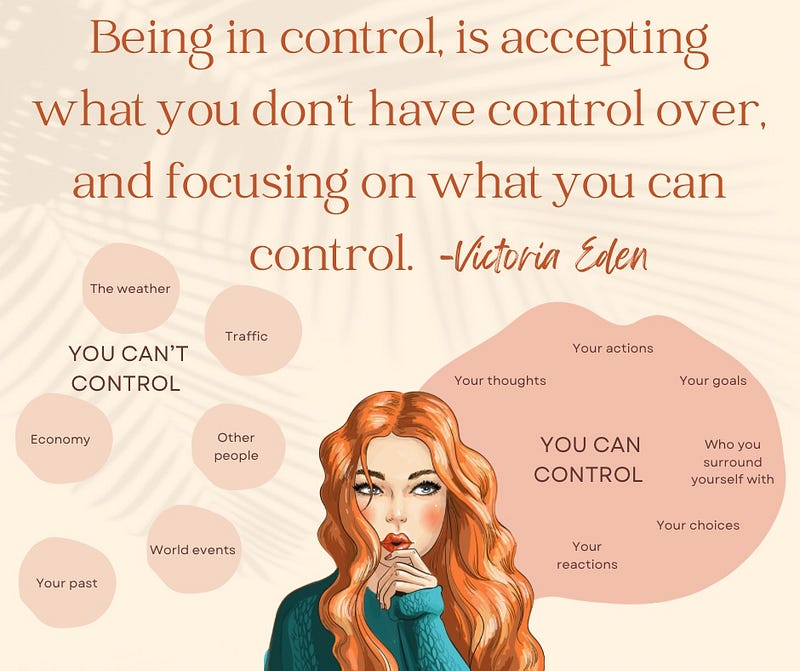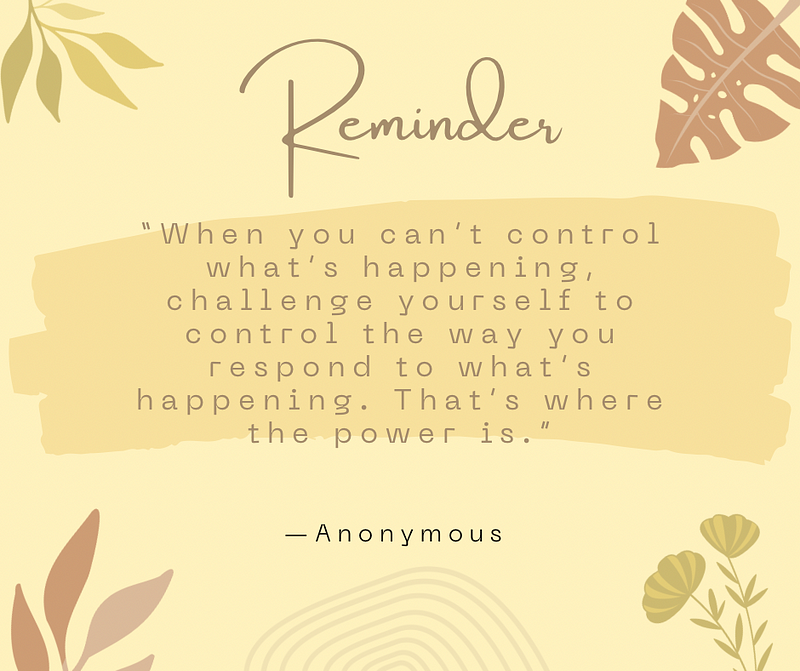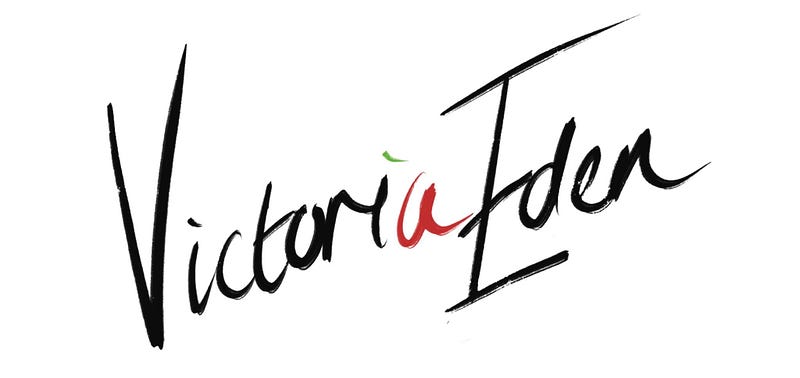Embracing Control: A Journey Towards Self-Worth and Acceptance
Written on
Chapter 1: The Power of Perspective
Reflecting on my past writings, particularly one about control from nearly a year ago, has been enlightening. Though I didn't share it then, journaling serves as a form of therapy for me, helping to process emotions. Today, as I revisit those words, I see numerous chances to reshape my feelings and enhance my outlook on the entire experience. Daily, I strive to acknowledge and accept where my influence lies, which in turn, brings me greater contentment in everyday life. It’s crucial to remember that while I cannot dictate others’ thoughts, actions, or opinions, I can choose how much I allow these to affect me.
With a sense of pride, I recall the accomplishments I achieved during my tenure at that company. I take pride in my strong work ethic and dedication. Yet, I also remember the exhaustion I felt being in a negative environment, which significantly impacted my mental health. It’s empowering to recognize that I had the courage to leave for my own wellbeing. Ultimately, I’ve learned that my self-worth should not be contingent on others’ perceptions. I define my identity through my self-assessment, not through external validation. It's easy to internalize negative feedback, but reinforcing my own value is essential.

So here’s the blog I penned a year ago.
Today marked my final day at a company where I dedicated seven years of my career, and I feel unappreciated and undervalued by my former bosses. Since my arrival, I have embraced increasing responsibilities and poured my heart into my work. The role compensated me for specific tasks, but I often invested personal time and resources for additional preparations.
For the first six years, I genuinely enjoyed each moment at work. I felt proud and consistently gave my all. It fueled my motivation to enhance my skills. However, the last year brought a shift in management that stole my joy. I realized it was time to move on. Previously, my willingness to sacrifice my free time was appreciated; this past year, however, I was expected to exceed expectations without acknowledgment. Thus, I submitted my resignation amicably, expressing my continued support for the small business until they found a replacement.
Fast forward to today, I returned my keys without a single word from my bosses—no thanks, no good wishes for my future, not even a notification to my clients about my departure. I came home feeling as though my efforts had been in vain. Why did I invest so much in a company that seemingly valued me so little?
Typically, I would indulge in tears and perhaps comfort myself with ice cream, convincing myself of my insignificance. Yet, I recognize that I cannot control how others treat me. After this past year, I could have generated significant revenue for them, yet I would still feel overlooked. So why should I let this affect me? Deep down, I know I gave my best, and I will hold my head high, proud of my contributions. I don’t require a thank-you note or social media acknowledgment to affirm my importance. I must remind myself of my worth.
Instead of succumbing to sadness, I will celebrate my achievements during my time there. I forged a valuable friendship with a colleague, contributed to remarkable projects, and grew immensely as an individual. I might still enjoy that ice cream or a glass of wine, but I won’t allow someone else’s actions to undermine my self-worth. While I cannot control how people treat me, I can dictate how their actions impact me. Ultimately, what matters is my pride in the accomplishments I achieved over the past seven years.
With this understanding, I feel a sense of excitement and optimism for the next chapter in my journey.

Armed with the knowledge of where my control lies, I look forward to the journey ahead.
Take care,
Tori x

Chapter 2: Accepting What You Can't Control
Sometimes, embracing what we cannot change is crucial for personal growth.
The first video, "Accepting What You Can't Control," offers insightful perspectives on letting go of the need to control external factors in our lives, promoting acceptance and inner peace.
Chapter 3: Radical Acceptance
Radical acceptance enables us to free ourselves from emotional turmoil.
The second video, "Radical Acceptance: Let GO Of What You CAN'T CONTROL (DBT)," delves into techniques for embracing reality and cultivating resilience in the face of adversity.
Thank you for taking the time to read! If you found this helpful, please consider following the publication and engaging with your thoughts. Interested in contributing to Mindful Mental Health? Check out our submission guidelines and express your interest in the comments section.